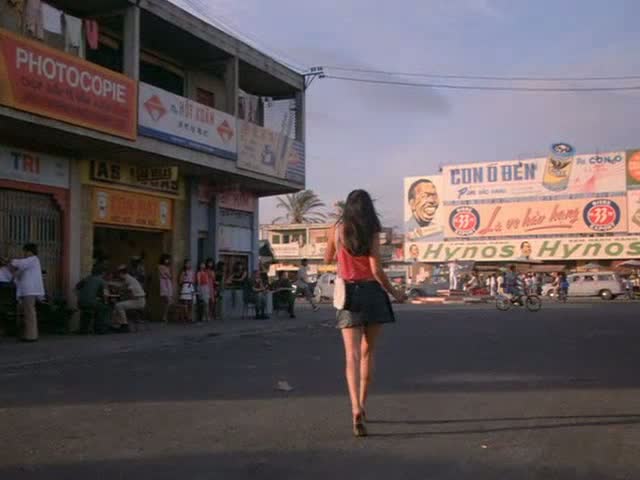
Monday, September 26, 2011
Me Love You Long Time
Here is one clip from a hard hitting Viet Nam war movie: Full Metal Jacket which is a 1987 war film produced and directed by Stanley Kubrick. It is an adaptation of the 1979 novel The Short-Timers by Gustav Hasford and stars Matthew Modine as the main character nicknamed "Joker." In this scene, Joker was having some off time just prior to the 1968 big famous Tet offensive that was the definitive turning point of the Viet-Nam war. This scene was famous with Nancy Sinatra's These Boots Are Made for Walkin' and the "Me So Horny" and "Me Love You Long Time" of the Da Nang's hooker. This is the only light moments of this very tense war movie full of scenes not for the faint of hearts, especially that of the deranged marine who killed the drill sergeant and committed suicide after his famous uttering "Seven-six-two millimeter. Full metal jacket" which was the specification of the ammunition used by the infantry riflemen during this war.


Wednesday, September 21, 2011
Willie
How about some country music for a change? Willie Nelson was joined on stage by some of the biggest names in country music for a concert to celebrate his 70th birthday in 2003. The live event was released on a DVD entitled "Willie Nelson & Friends: Live & Kickin." This clip is a 14 minute excerpt from that DVD. If you didn't like the operas, you may like this.


Tuesday, September 20, 2011
Miminashi Hoichi
Hoichi the Earless (耳なし芳一 Miminashi Hōichi) is a character from Japanese mythology. His story is well known in Japan, and the best-known English translation first appeared in the book Kwaidan: Stories and Studies of Strange Things by Lafcadio Hearn.
A version of this story appears in the film Kwaidan, as well as the play The Dream of a Summer Day, which are both based on Hearn's work. Hoichi the Earless is closely associated with Akama Shrine in Shimonoseki, as his story takes place at the Buddhist temple Amidaji, which preceded the shrine before Shintō became the state religion of Japan. According to legend, Hoichi was a blind minstrel (or biwa hoshi) with amazing gifts for the biwa (a loquat-shaped Japanese lute). He was particularly good at performing the Tale of the Heike, an epic describing the fall of Emperor Antoku, who is buried at Amidaji Temple. His performances were so wonderful that "even the goblins could not refrain from tears."
The ghosts of Emperor Antoku's dynasty came and lead Hoichi to nightly performances at the palace that really is the cemetery among the tombs. It is also well known that a person that has developed a relationship with the world beyond would eventually expire due to these nefast influences... as it is evident on the face of Hoichi. That didn't escape the attention of the head priest of the Amidaji temple and he decided to help Hoichi with an eastern version of exorcism... or rather a preemptive move to ward off the ghosts' attempts. The standard most effective remedy is to paint Hoichi's body with the Kanji characters of the Heart Sutra for protection that makes him invisible to the ghosts. Unfortunately, a grievous oversight took place and his ears did not get any of the magic Kanji letters. The ghosts came, they only saw the ears so they took them to their Emperor as proof that they did their diligence. Thus Hoichi became the Earless but survived to continue playing his biwa.
This clip comes from the movie Kwaidan in the Criterion collection. This movie is pretty dark and scary with many ghosts. I no longer watch Kwaidan because I will surely get a heart attack if I do. I told you I'm afraid of ghosts, especially the beautiful ones in form of beautiful but lethal women who usually are either snakes or worse, foxes. Not for me! Besides, if the head priest wants to paint my body with Kanji stuff, he'll tickle me to death way before the beautiful women get to me.
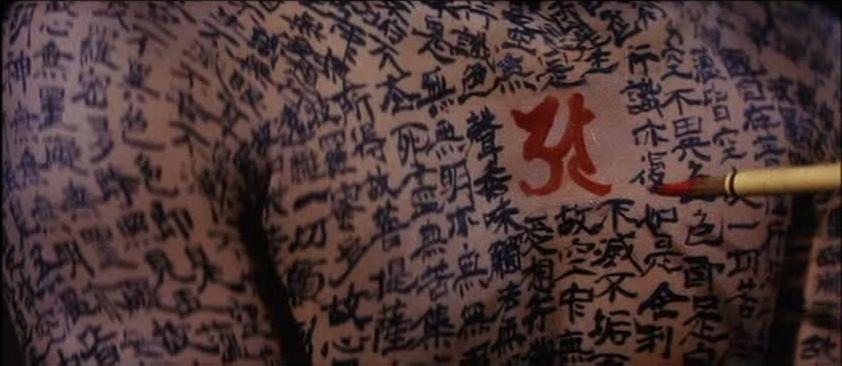
A version of this story appears in the film Kwaidan, as well as the play The Dream of a Summer Day, which are both based on Hearn's work. Hoichi the Earless is closely associated with Akama Shrine in Shimonoseki, as his story takes place at the Buddhist temple Amidaji, which preceded the shrine before Shintō became the state religion of Japan. According to legend, Hoichi was a blind minstrel (or biwa hoshi) with amazing gifts for the biwa (a loquat-shaped Japanese lute). He was particularly good at performing the Tale of the Heike, an epic describing the fall of Emperor Antoku, who is buried at Amidaji Temple. His performances were so wonderful that "even the goblins could not refrain from tears."
The ghosts of Emperor Antoku's dynasty came and lead Hoichi to nightly performances at the palace that really is the cemetery among the tombs. It is also well known that a person that has developed a relationship with the world beyond would eventually expire due to these nefast influences... as it is evident on the face of Hoichi. That didn't escape the attention of the head priest of the Amidaji temple and he decided to help Hoichi with an eastern version of exorcism... or rather a preemptive move to ward off the ghosts' attempts. The standard most effective remedy is to paint Hoichi's body with the Kanji characters of the Heart Sutra for protection that makes him invisible to the ghosts. Unfortunately, a grievous oversight took place and his ears did not get any of the magic Kanji letters. The ghosts came, they only saw the ears so they took them to their Emperor as proof that they did their diligence. Thus Hoichi became the Earless but survived to continue playing his biwa.
This clip comes from the movie Kwaidan in the Criterion collection. This movie is pretty dark and scary with many ghosts. I no longer watch Kwaidan because I will surely get a heart attack if I do. I told you I'm afraid of ghosts, especially the beautiful ones in form of beautiful but lethal women who usually are either snakes or worse, foxes. Not for me! Besides, if the head priest wants to paint my body with Kanji stuff, he'll tickle me to death way before the beautiful women get to me.

Monday, September 12, 2011
Easy To Love
A recent blog of the movie "Midnight in Paris" highlighted Cole Porter. To know who Cole Porter was, you ought to watch the movie "DeLovely." You can find several blogs I made of this movie, one of which is here. That clip has a well loved song by Porter "Easy To Love." You may want to see my clip of March 2007 to see Kevin Kline play the piano and hear him sing this Cole Porter tune when he was declaring to divorcee Linda Lee Thomas, played by my favorite actress Ashley Judd.
This famous song was featured in many movies and recorded by all of the best vocalists. Today's clip is from a movie by Woody Allen (again... that's because his movies always have fabulous choice of music that is worth showcasing,) Anything Else. Christina Ricci, also my favorite actress, is in the role of adorable Amanda, always arriving late to her dates. This movie starts with a sound track of Billie Holliday singing "Easy To Love."
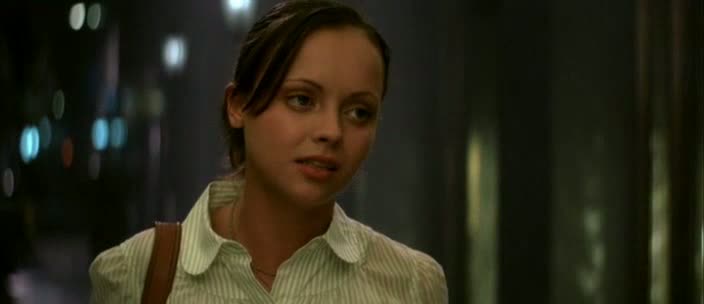
Click on this player to hear "Easy To Love" by Billie Holliday.
Click on this player to hear "Easy To Love" by Ella Fitzgerald.
This famous song was featured in many movies and recorded by all of the best vocalists. Today's clip is from a movie by Woody Allen (again... that's because his movies always have fabulous choice of music that is worth showcasing,) Anything Else. Christina Ricci, also my favorite actress, is in the role of adorable Amanda, always arriving late to her dates. This movie starts with a sound track of Billie Holliday singing "Easy To Love."

Click on this player to hear "Easy To Love" by Billie Holliday.
Click on this player to hear "Easy To Love" by Ella Fitzgerald.
Friday, September 09, 2011
Shooting Fish in a Barrel
The guitar is still stuck in my mind, so here is another clip about that musical instrument.
Early in his career, in 1969, Woody Allen signed a contract with United Artists. He wrote "The Jazz Baby," a screenplay about a jazz musician set in the thirties but that was turned down by the UA executives. He replaced that with "Bananas," which I do not like much. In 1998, he returned to his original idea and out came "Sweet and Lowdown," telling the story of a fictional arrogant, obnoxious, alcoholic jazz guitarist named Emmet Ray (played by Sean Penn after they could not get Johnny Depp because he was not available) who regards himself as perhaps the best guitarist in the world, or second best, after his idol, Django Reinhardt.
Sweet and Lowdown was nominated for Academy Awards for Best Actor in a Leading Role (Sean Penn) and Best Actress in a Supporting Role (Samantha Morton.) Morton played the role of Hattie, a lovable young mute girl who did not utter a single word of dialogue in the film. Her performance was met with lots of critical acclaim.
The music for the film was arranged and conducted by Dick Hyman. All of the guitar solos were played by guitarist Howard Alden. Alden also coached Sean Penn on playing the guitar for his role in the film. The soundtrack of this movie is excellent, containing 15 memorable songs mostly to showcase the guitar solos.
In this clip, Penn went cruising with his buddy and they picked up two young women. After a short straw decision, Penn was stuck with Hattie, who was mute, and took her to his room with a promise to play the guitar for her, a promise he kept. She instantly fell in love with his playing... If you can find the time, watch this movie. It's refreshingly good and very entertaining.

Early in his career, in 1969, Woody Allen signed a contract with United Artists. He wrote "The Jazz Baby," a screenplay about a jazz musician set in the thirties but that was turned down by the UA executives. He replaced that with "Bananas," which I do not like much. In 1998, he returned to his original idea and out came "Sweet and Lowdown," telling the story of a fictional arrogant, obnoxious, alcoholic jazz guitarist named Emmet Ray (played by Sean Penn after they could not get Johnny Depp because he was not available) who regards himself as perhaps the best guitarist in the world, or second best, after his idol, Django Reinhardt.
Sweet and Lowdown was nominated for Academy Awards for Best Actor in a Leading Role (Sean Penn) and Best Actress in a Supporting Role (Samantha Morton.) Morton played the role of Hattie, a lovable young mute girl who did not utter a single word of dialogue in the film. Her performance was met with lots of critical acclaim.
The music for the film was arranged and conducted by Dick Hyman. All of the guitar solos were played by guitarist Howard Alden. Alden also coached Sean Penn on playing the guitar for his role in the film. The soundtrack of this movie is excellent, containing 15 memorable songs mostly to showcase the guitar solos.
In this clip, Penn went cruising with his buddy and they picked up two young women. After a short straw decision, Penn was stuck with Hattie, who was mute, and took her to his room with a promise to play the guitar for her, a promise he kept. She instantly fell in love with his playing... If you can find the time, watch this movie. It's refreshingly good and very entertaining.

Thursday, September 08, 2011
At Sea Funeral
This is why the Gloria N. sailed to the island of Erimo, to spread soprano Edmea Tetua's ashes in the waters of the island of her birth. I think that no matter how much you hate a person, you probably would shed some tears at that person's funeral because death is so final! Again, the somber mood is reintroduced with the sad piano score of Rossini's Agnus Dei. After a brief ritual, the soprano's voice is heard from a gramophone. What you hear is the great and very well known aria from the third act of Verdi's Aida: O Patria Mia. That aria is sung by an Ethiopian princess, daughter of king Amonasro, held captured as slave by the Egyptians. In love with Radames, an Egyptian general, she is lamenting that her love is lost and she intends to commit suicide in the river Nile, and will never again see her country. Well... I am sorry to be so dramatic in my explanation, but that is what operas are about.
Despite intense jealousy and envy, soprano Cuffari broke down along with others in attendance. The very brief shot of Tetua's lover is shown again just prior to the frames showing that all ashes have been dispersed by the wind.
If you have not seen this movie, try to watch it. "E La Nave Va"'s music score is truly exquisite, and there are so many interesting characters to enjoy, including that of a love sick rhinoceros! What? Watch this movie to see the final scenes.
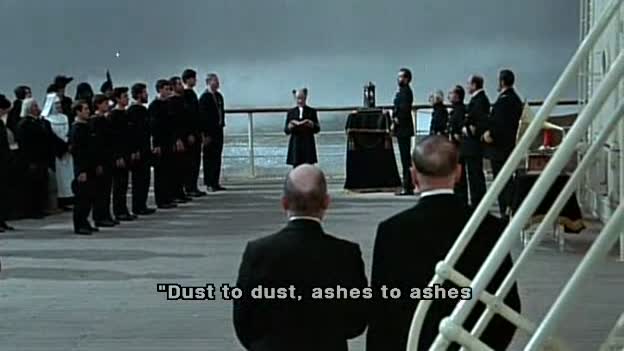
Despite intense jealousy and envy, soprano Cuffari broke down along with others in attendance. The very brief shot of Tetua's lover is shown again just prior to the frames showing that all ashes have been dispersed by the wind.
If you have not seen this movie, try to watch it. "E La Nave Va"'s music score is truly exquisite, and there are so many interesting characters to enjoy, including that of a love sick rhinoceros! What? Watch this movie to see the final scenes.

Wednesday, September 07, 2011
Operatic Impromptu
Stark contrast between society classes in Italy in the 10s is obvious in "E La Nave Va." It is seen repeatedly throughout the movie but none is as eloquent as this clip is showing you: the huge difference between the poor working class and the high upper echelon that the operatic stars represent. In the first clip when the ocean liner departs, a quick glimpse of the sweating men stoking the boiler was shown during the choral of Verdi's "La forza del destino (The Force of Destiny)." In this clip, during a tour given by the ship's captain, the working men asked the most prominent diva, soprano Ildebranda Cuffari, to sing for them. She was immediately upstaged by tenor Aureliano Fuciletto. What follows is a fierce competition from all the others, to the delight of the crew. If you watch again the first clip, you would have seen the disdain tenor Fuciletto displayed for soprano Cuffari when she arrived in her car.
The point here is that these voices are so marvelous, they can compete against the deafening noise from the engine in the boiler room. I will add one more clip from this film, the actual at sea funeral... before moving on to a different movie. Another Fellini? How about Casanova? Now, that movie is INTENSE!
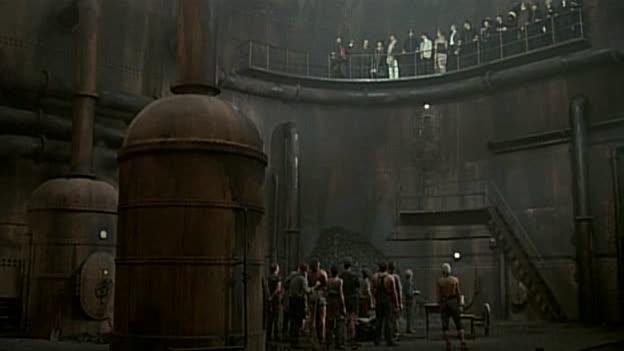
The point here is that these voices are so marvelous, they can compete against the deafening noise from the engine in the boiler room. I will add one more clip from this film, the actual at sea funeral... before moving on to a different movie. Another Fellini? How about Casanova? Now, that movie is INTENSE!

Tuesday, September 06, 2011
Glass Symphony
Confined in a ship inching to the island of Erimo in the Adriatic Sea, what are the music giant maestro, conductors, composers, entertainers to do? The maestro in this clip are creating an impromptu symphony to entertain the workers in the kitchen. To their delight, Schubert's Moment Musical No. 3 in f minor is in the program, played on crystal glasses and bottles. Below is an MP3 player on which you can click to hear a recital by Valerian Shiukshvili of the same Schubert piece on the piano... To be continued...
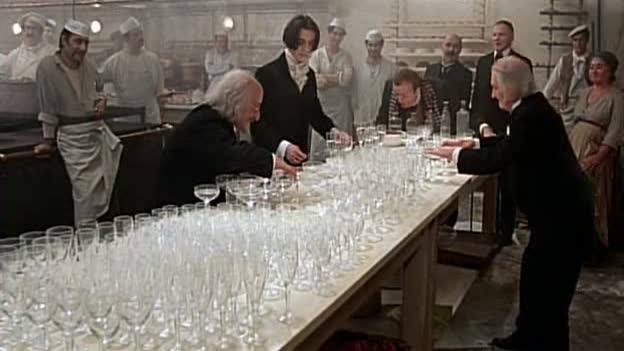
Click on the player to hear the music track.

Click on the player to hear the music track.
E La Nave Va
And the Ship Sails On (Italian: E la nave va) is a 1983 Italian film by Federico Fellini. It depicts the events on board a luxury liner filled with the friends (and some enemies as well) of a deceased opera star, diva Edmea Tetua. Many of Italy's most famous operatic names gathered to mourn her death.
In December 2006, I blogged three clips from this movie. Those video streams are no longer viewable and I decided to repeat them here because I think this movie is truly underated and regrettably is largely unknown. I place this movie to the same level as Felllini's Amarcord. It is a second Amarcord with a great soundtrack to boast. Felini was known to hate operas. Somehow, he made this movie that is populated with nothing less than numerous characters to portray an entire ensemble of the most famous stars of the operatic world.
The movie is about a special ocean voyage that was commissioned in 1914, only a few weeks before World War 1 broke out, to scatter the ashes of Edmea Tetua, the world-famous opera star who passed away. She was born in the island of Erimo, and wished to have her remains scattered in its waters. The cruise ship Gloria N. was setting sail from Naples harbor. You must know that this movie was shot entirely in Rome's Cinecitta studios, and there was no ocean liner or battle ship. The huge sets were constructed by Oscar-winning set designer Dante Ferretti.
The first clip shows a very original way that Fellini conveyed the time stamp of his story: the time of silent movies in sepia colors of the 1910s, when the cameras were hand held. While the reporter Orlando assigned to cover this event prepares for his job with the cameraman, many of the main characters of the movie arrive to board the ocean liner, including the proud soprano Ildebranda Cuffari who wants to take the coveted place of Tetua now left vacant. After more than 4 minutes with only the cracking noise of the hand-cranked camera, the music comes alive with Agnus Dei - from Petite Messe Solennelle by Gioachino Rossini with Gianfranco Plenizio at the piano. Now the audience realizes it is a funeral and the ashes of Edmea Tetua is being carried onto the ship. It is not clear who the sole woman in black veil who follows the urn was, but the man wearing a scarf you see blowing a kiss to the urn was Tetua's lover.
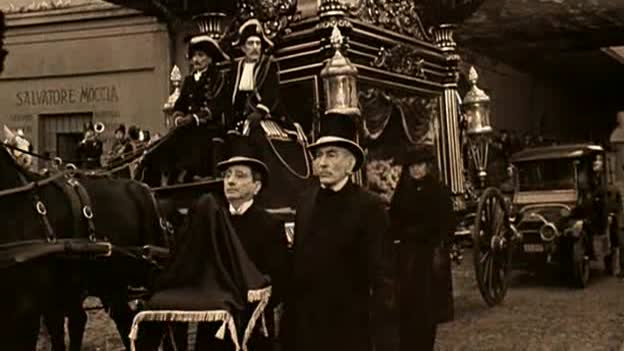
The next clip follows with Verdi's Overture to The Force of Destiny for the departure of the ocean liner. The conductor is Il Maestro Albertini. The film moves from the kitchen to the luxury dining room with Piotr Ilich Tchaikovsky's Waltz of the Flowers from "The Nutcracker." To be continued...
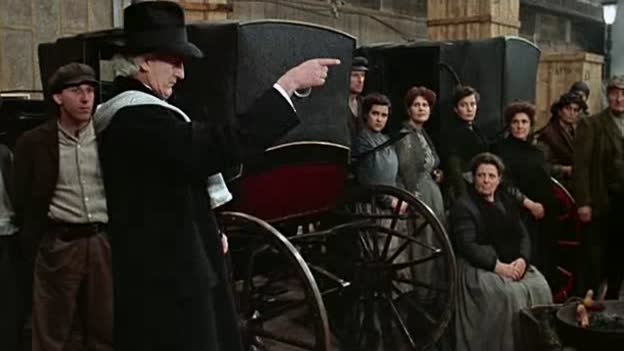
In December 2006, I blogged three clips from this movie. Those video streams are no longer viewable and I decided to repeat them here because I think this movie is truly underated and regrettably is largely unknown. I place this movie to the same level as Felllini's Amarcord. It is a second Amarcord with a great soundtrack to boast. Felini was known to hate operas. Somehow, he made this movie that is populated with nothing less than numerous characters to portray an entire ensemble of the most famous stars of the operatic world.
The movie is about a special ocean voyage that was commissioned in 1914, only a few weeks before World War 1 broke out, to scatter the ashes of Edmea Tetua, the world-famous opera star who passed away. She was born in the island of Erimo, and wished to have her remains scattered in its waters. The cruise ship Gloria N. was setting sail from Naples harbor. You must know that this movie was shot entirely in Rome's Cinecitta studios, and there was no ocean liner or battle ship. The huge sets were constructed by Oscar-winning set designer Dante Ferretti.
The first clip shows a very original way that Fellini conveyed the time stamp of his story: the time of silent movies in sepia colors of the 1910s, when the cameras were hand held. While the reporter Orlando assigned to cover this event prepares for his job with the cameraman, many of the main characters of the movie arrive to board the ocean liner, including the proud soprano Ildebranda Cuffari who wants to take the coveted place of Tetua now left vacant. After more than 4 minutes with only the cracking noise of the hand-cranked camera, the music comes alive with Agnus Dei - from Petite Messe Solennelle by Gioachino Rossini with Gianfranco Plenizio at the piano. Now the audience realizes it is a funeral and the ashes of Edmea Tetua is being carried onto the ship. It is not clear who the sole woman in black veil who follows the urn was, but the man wearing a scarf you see blowing a kiss to the urn was Tetua's lover.

The next clip follows with Verdi's Overture to The Force of Destiny for the departure of the ocean liner. The conductor is Il Maestro Albertini. The film moves from the kitchen to the luxury dining room with Piotr Ilich Tchaikovsky's Waltz of the Flowers from "The Nutcracker." To be continued...

Sunday, September 04, 2011
Carmen
Back in 2007, I blogged 2 clips: Gypsy & Toreador from a great screen opera of Bizet's famous Carmen. But that was done very low key and I did not say much about this production. Now, let's give it a second look. Shot entirely on location in Andalusian Spain, this screen version of Bizet's Carmen has been hailed as the definitive version of this classic opera. In this version, Placido Domingo and Julia Migenes-Johnson sing and dance to tell the story that took place in 19th century Seville. This story is well known: tempestuous Carmen (Migenes-Johnson) seduces a naive Army corporal, Don Jose (Domingo), newly assigned to the village fortress. Madly in love, Jose abandons his career, his fiancée and his dying mother to follow the sultry gypsy in her nomad life style. Soon, Carmen abandons him for her new conquest, toreador Escamillo (Ruggero Raimondi). Crazed with jealousy, Jose begs Carmen to return to him, but her taunting declaration of independence results in tragedy.
This clip lets you hear a small portion of Bizet's intoxicating melodies and his famous "Habanera" in a production that sets itself apart from all other performances. The clip ends with a Don Jose hopelessly fallen for his Carmencita that he just met.
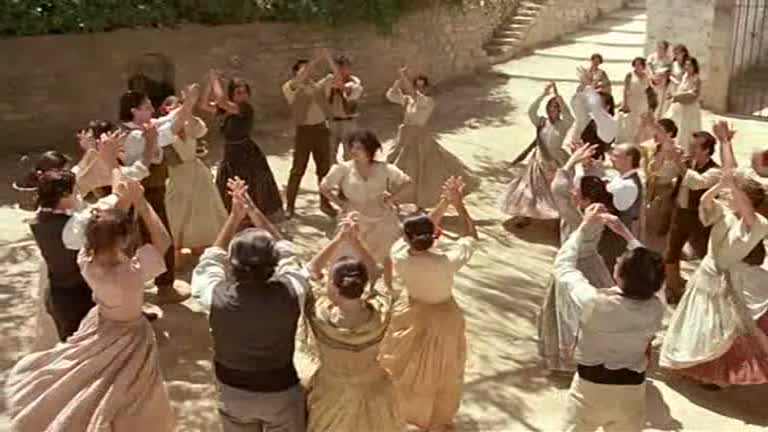
This clip lets you hear a small portion of Bizet's intoxicating melodies and his famous "Habanera" in a production that sets itself apart from all other performances. The clip ends with a Don Jose hopelessly fallen for his Carmencita that he just met.

Thursday, September 01, 2011
Cinema Paradiso
You are Sicilian, You live in the late 40s after World War II. What do you do for entertainment? Thank heaven to "Cinema Paradiso!" This clip shows you that nostalgic period of time when life was simple, the pleasure of life was few but lasting long and deep. In this clip, you see an adolescent Toto. Salvatore is now a handsome young man who takes over the projectionist job after Alfredo was blinded by a fierce fire that demolished the older "Cinema Paradiso." Toto is seen holding a pack of books at the beginning of the clip, near Ciccio, the man on the phone who is the new owner of the cinema. If you want to know about the sad love story between Toto and a local beauty Elena, find and watch this movie. It's worth your time and you'll love the beautiful ending.
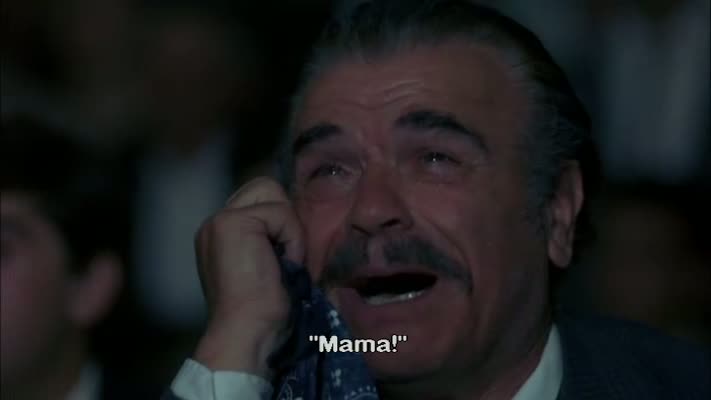

Subscribe to:
Comments (Atom)


